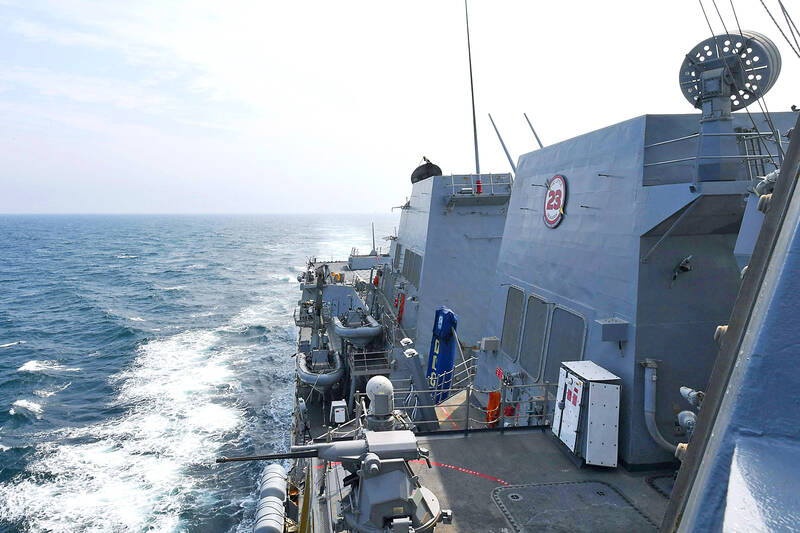Beijing is increasingly using lawfare as a means of weakening Taiwan, a source said.
Through lawfare, Beijing aims to define a legal basis for the annexation of Taiwan, employ long-arm jurisdiction, deter foreign involvement in Taiwan’s defense, facilitate the “internalization” of the Taiwan Strait and promote the misinterpretation of UN Resolution 2758, they said.
China’s “guidelines” to penalize “die-hard” Taiwanese independence separatists, including with the death penalty, were part of its lawfare strategy, they said, adding that the guidelines — originally intended to be used after Taiwan’s annexation — were implemented in advance to target active members of Taiwan’s military and demoralize the public.

Photo: US Navy via AP
There are many local collaborators who were also helping Beijing with its strategy, which warranted close attention by authorities, the source said.
“There might be a follow-up to the [People’s Liberation Army] PLA’s large-scale joint military exercise in the near future, so Taiwan must take precautions,” they said. “Taiwan must guard against a possible shift by the PLA from drills to war, and it must also be able to strike back at critical points.”
Meanwhile, Institute for National Defense and Security Research research fellow Su Tzu-yun (蘇紫雲) said China’s “anaconda strategy” was an objective fact.
Su was referencing remarks made by Navy Commander Tang Hua (唐華) in an interview with The Economist last week that Beijing’s “anaconda strategy” aims to “strangle Taiwan” and deter foreign intervention in a Taiwan-China conflict.
“The [Chinese Communist Party] CCP does have the ability to blockade the Taiwan Strait, but it does not mean that such a blockade would be successful,” Su said on Sunday.
Article 2 of the Taiwan Relations Act stipulates that if China uses non-peaceful means, including embargoes or blockades, against Taiwan, the US would consider that a “grave concern” and might intervene, and China would face an unpredictable situation, he said.
“However, in the interim before the US could respond, Taiwan would have to be prepared to rely on itself,” he added.
China would want to achieve its aims with such a blockade as quickly as possible to avoid foreign intervention, Su said.
“If the blockade became protracted, that would likely trigger international intervention and China would face a dilemma,” Su added.
Taiwan’s military has always had anti-blockade measures planned and has held drills, he said.
“In response to the improvement of China’s naval strength, Taiwan would of course adopt new measures, including anti-ship missiles and anti-blockade equipment installed 200km offshore,” Su said.
Taiwan would also increase strategic material inventories to strengthen its defense resilience, he said.
“If submarines form combat capabilities in the future, they could also be employed to counter a Chinese blockade,” he added.

Chinese Nationalist Party (KMT) Chairman Eric Chu (朱立倫), spokeswoman Yang Chih-yu (楊智伃) and Legislator Hsieh Lung-chieh (謝龍介) would be summoned by police for questioning for leading an illegal assembly on Thursday evening last week, Minister of the Interior Liu Shyh-fang (劉世芳) said today. The three KMT officials led an assembly outside the Taipei City Prosecutors’ Office, a restricted area where public assembly is not allowed, protesting the questioning of several KMT staff and searches of KMT headquarters and offices in a recall petition forgery case. Chu, Yang and Hsieh are all suspected of contravening the Assembly and Parade Act (集會遊行法) by holding

PRAISE: Japanese visitor Takashi Kubota said the Taiwanese temple architecture images showcased in the AI Art Gallery were the most impressive displays he saw Taiwan does not have an official pavilion at the World Expo in Osaka, Japan, because of its diplomatic predicament, but the government-backed Tech World pavilion is drawing interest with its unique recreations of works by Taiwanese artists. The pavilion features an artificial intelligence (AI)-based art gallery showcasing works of famous Taiwanese artists from the Japanese colonial period using innovative technologies. Among its main simulated displays are Eastern gouache paintings by Chen Chin (陳進), Lin Yu-shan (林玉山) and Kuo Hsueh-hu (郭雪湖), who were the three young Taiwanese painters selected for the East Asian Painting exhibition in 1927. Gouache is a water-based

Taiwan would welcome the return of Honduras as a diplomatic ally if its next president decides to make such a move, Minister of Foreign Affairs Lin Chia-lung (林佳龍) said yesterday. “Of course, we would welcome Honduras if they want to restore diplomatic ties with Taiwan after their elections,” Lin said at a meeting of the legislature’s Foreign Affairs and National Defense Committee, when asked to comment on statements made by two of the three Honduran presidential candidates during the presidential campaign in the Central American country. Taiwan is paying close attention to the region as a whole in the wake of a

OFF-TARGET: More than 30,000 participants were expected to take part in the Games next month, but only 6,550 foreign and 19,400 Taiwanese athletes have registered Taipei city councilors yesterday blasted the organizers of next month’s World Masters Games over sudden timetable and venue changes, which they said have caused thousands of participants to back out of the international sporting event, among other organizational issues. They also cited visa delays and political interference by China as reasons many foreign athletes are requesting refunds for the event, to be held from May 17 to 30. Jointly organized by the Taipei and New Taipei City governments, the games have been rocked by numerous controversies since preparations began in 2020. Taipei City Councilor Lin Yen-feng (林延鳳) said yesterday that new measures by